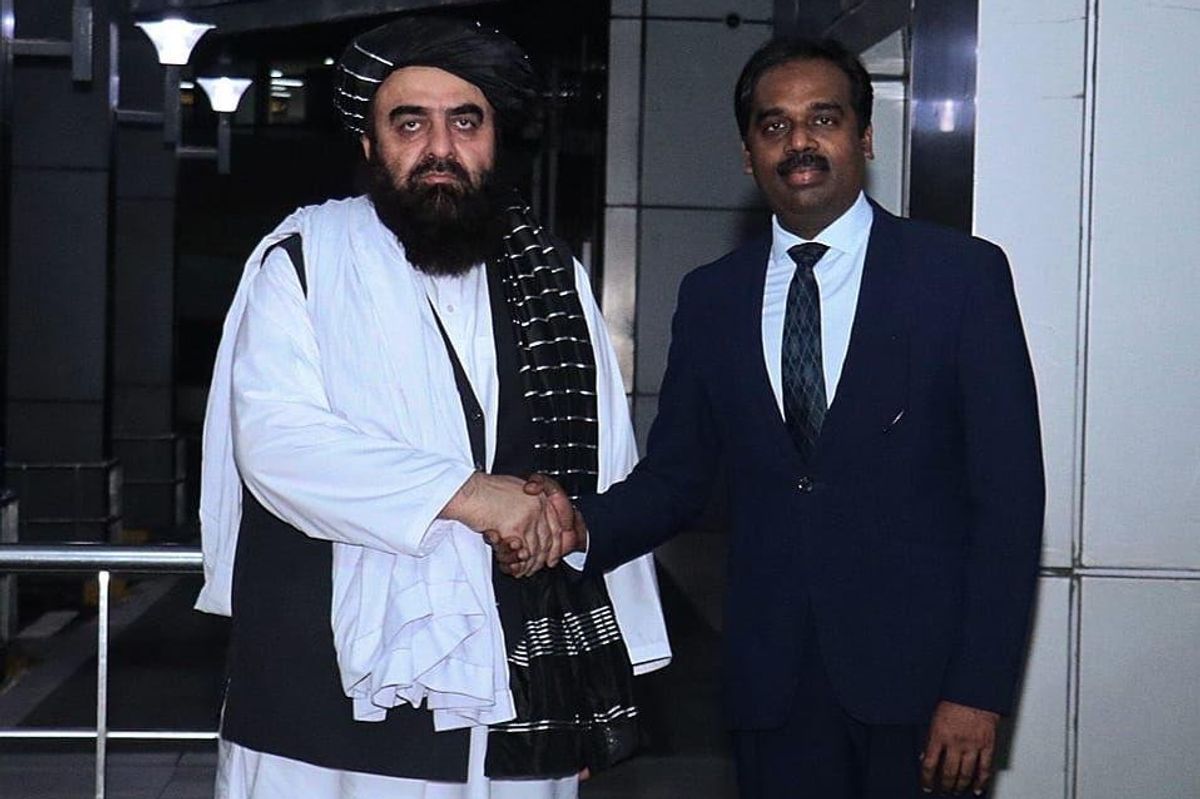Afghan FM in Delhi: A geopolitical reset in motion?
Amir Khan Muttaqi’s India visit marks the first official Taliban engagement with New Delhi since 2021

Asma Kundi
Producer, Islamabad
Asma Kundi is a multimedia broadcast journalist with an experience of almost 15 years. Served national and international media industry as reporter, producer and news editor.

Afghanistan’s Foreign Minister Amir Khan Muttaqi arrives in New Delhi on October 9, 2025.
Courtesy: X/@MEAIndia
Afghanistan’s Foreign Minister Amir Khan Muttaqi arrived in New Delhi on Thursday, marking a significant moment in regional diplomacy as the first official Taliban visit to India since their takeover in 2021.
The Afghan envoy is set to meet Indian Foreign Minister S. Jaishankar and other senior officials to discuss political cooperation, trade opportunities, and economic engagement.
The trip, authorized under a United Nations Security Council travel ban exemption on September 30, represents a breakthrough in India’s outreach to the Taliban, who until recently were largely isolated on the international stage.
Muttaqi’s arrival follows a regional summit in Moscow, where Afghanistan’s neighboring states — including Pakistan, Iran, China, and the Central Asian republics — jointly opposed the deployment of any foreign military bases in the region. Observers view this stance as a collective response to reports that Washington may be seeking to reassert influence through the former U.S. airbase at Bagram.
So far, Russia stands alone as the only nation to have formally recognized the Taliban government. India and Afghanistan once maintained a close partnership, but those ties were disrupted after the Taliban’s return to power in 2021, prompting New Delhi to close its embassy in Kabul. A year later, India cautiously re-established a limited diplomatic presence focused on humanitarian aid and essential services.
While India has yet to extend formal recognition to the Taliban, its recent outreach suggests a pragmatic shift — one aimed at reopening dialogue and safeguarding its strategic interests in Afghanistan amid shifting regional dynamics.
For Islamabad, the optics are starker, serving as a reminder that its leverage in Kabul is steadily diminishing at a time of rising border tensions and resurgent militancy.
A cautious thaw
Former Pakistani Ambassador to Kabul Mansoor Ahmed Khan told Nukta that the Taliban leadership is fully aware of India’s past position toward them. “For nearly two decades, when the Afghan Taliban were engaged in an armed struggle against U.S. and NATO forces, India consistently labeled them as terrorists and refused to engage in dialogue. The Taliban and the Afghan people have not forgotten that phase,” he said.
“Now, if India is inviting them for talks, it is a positive development — but such engagement should remain within the bounds of normal state-to-state relations and must not work against any other country, particularly Pakistan.”
The former envoy added that Pakistan should not object to relations between Afghanistan and India as long as they do not harm its national interests. “I don’t believe this visit will significantly affect the geopolitical balance in South Asia,” he observed.
He stressed that since the Afghan Taliban are now the governing authority in Afghanistan, their priority should be to establish a constitutional and institutional framework that ensures political stability and legitimacy. “They need to engage constructively with neighboring and regional countries to move toward normalization. China and Pakistan, along with Central Asian states, have extended consistent support over the past four years, which should help Afghanistan move forward on the path of stability and international recognition.”
Commenting on the China factor, he said, “If India aims to counterbalance or contain China, it must recognize that Beijing’s ability to contribute to peace, stability, and development is far greater. China has made significant efforts through platforms like the China-Pakistan-Afghanistan trilateral dialogue — particularly this year — to prevent Afghanistan’s situation from deteriorating further.”
Pakistan’s influence waning?
“India is filling the vacuum created by mistrust between Pakistan and the Taliban,” said Dr. Qamar Cheema, Executive Director of the Sanober Institute.
According to Cheema, the Taliban’s push to diversify its partnerships has made India and several Arab states preferred new allies. However, he cautioned that Kabul should not overlook the deterioration of its relations with Pakistan, largely driven by non-cooperation on counterterrorism.
Pakistan, he added, has been working through institutional frameworks with China and Iran to hold the Taliban accountable, yet Kabul continues to sideline meaningful engagement with Islamabad.
Geopolitics in motion
The visit also reflects broader regional shifts. Earlier this year, China helped broker limited progress between Islamabad and Kabul, securing agreements on ambassador exchanges and CPEC-related cooperation. But Pakistan’s recent tilt toward Washington — driven by U.S. pressure on the Taliban over counterterrorism and American interest in regaining access to Bagram Airbase — has deepened Taliban mistrust of Islamabad as being too closely aligned with Western interests.
Meanwhile, U.S.-Taliban frictions over sanctions and human rights have left room for India to strengthen its own diplomatic channels.
Islamabad at a crossroads
As Muttaqi heads to New Delhi, Islamabad faces a sobering reality: its once-dominant position in Afghan affairs is slipping.
With China’s mediation losing traction, U.S. involvement reshaping Kabul’s calculus, and India stepping in with fresh momentum, Pakistan must recalibrate its strategy or risk being sidelined in a region where it long considered itself indispensable.










Comments
See what people are discussing